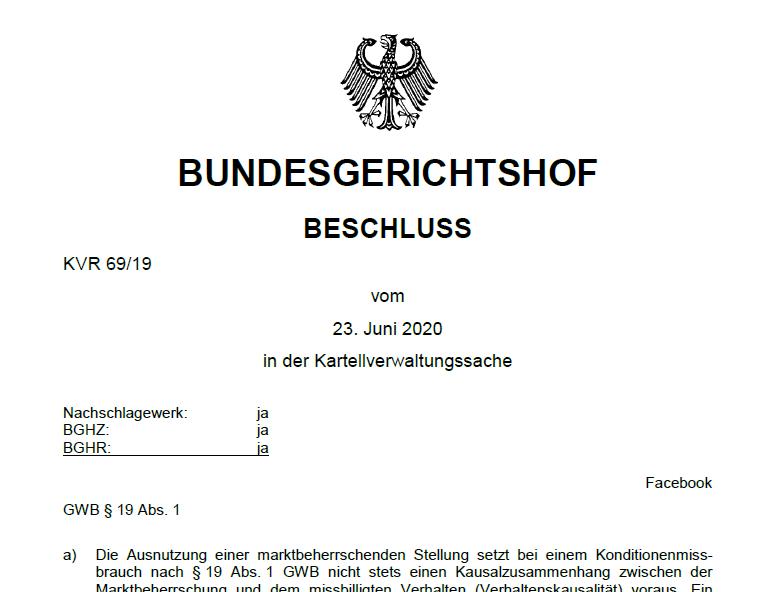
Facebook Case: The Reasoning
Here we go, fans of digital antitrust law! The German Federal Supreme Court (Bundesgerichtshof) published its reasoning for the interim decision in the Facebook case. What we had known so far about this decision had raised expectations. Rupprecht Podszun read the opinion and offers a first glance – with some English quotes from the judgement.
If the Bundesgerichtshof (BGH) had an Instagram account (it does not, oh mama mia) this would have made for a spectacular countdown from the ruling to the publication of the reasoning. Every influencer would have loved to have such an opportunity to keep followers in suspense: If Justin Bieber publishes a new song or some muscle monster a new photo of a close-to-explosion biceps, users are usually fed steadily to insanity before the song or photo is finally published. The BGH remained silent ever since it ruled on Facebook on 23 June 2020. Yet it has one thing in common with that Instagram muscle monster: Both once in a while flex their muscles. The difference is that the court has real influence.
In June, the Competition Senate – after a hearing – declared that it was siding with the Bundeskartellamt in the Facebook data case. All we got then was an oral statement by the Senate’s Chief Judge Peter Meier-Beck (who is – full disclosure – an honorary professor at Heinrich Heine University Düsseldorf) and a press release. Both sources of information fired our imagination, and so Daniela Seeliger and I speculated in this blog here and here on the reasoning behind the judgement. I tended to think that this ruling may establish a significant re-adjustment of competition policy with a stronger focus on consumer choice and the sovereignty of users to decide for themselves.
Now, let’s see what the Court was really thinking. You find the decision in German language here. Before we start (and this is a lengthy post), let me just say that the decision really has some very, very, very interesting aspects (read through to the end since I go through the case in chronological order).
What is it all about, again?

Just as a quick reminder: The Bundeskartellamt had seen a violation of section 19 of the German competition act (roughly equivalent to Art. 102 TFEU) in an exploitative abuse by Facebook. The exploitation was seen in the integration of user data from different sources (Facebook.com, Instagram, WhatsApp, third party-websites) under breach of the GDPR, the General Data Protection Regulation. So, privacy rules became a benchmark for the violation of competition law by a dominant company. The Higher Regional Court of Düsseldorf under its Presiding Judge Jürgen Kühnen (who – to give credit to our friends in Cologne – is an honorary professor at their University) had stopped the execution of the Bundeskartellamt’s decision in interim proceedings, stating that – among several other weaknesses – the decision lacked a convincing theory of harm. After this, it was the turn of the Bundesgerichtshof (BGH) to review the Düsseldorf decision on points of law.
The BGH did not duck out of the work. The opinion has 55 pages. That is A LOT. Remember, this is a summary judgment, interim proceedings only, this will carry on to main proceedings now, unless Facebook decides to drop out of litigation (which I would say is unlikely). Even in complicated and lengthy cases in main proceedings, take the round timber case (“Rundholzverfahren”) or the case on post-merger demands for rebates (“Hochzeitsrabatte”), decisions are thirty-somethings, pages-wise.
Jurisdiction?

The 55 pages are well-used to cover basically everything. This comes as a surprise since the Düsseldorf Court (whose decision is under review in this decision) had left out several parts of the Bundeskartellamt’s decision, arguing that even if the Amt was right on this the decision would still not hold – market definition for instance, or the whole GDPR bit.
Some observers wondered whether the BGH has jurisdiction at all to review the parts that had been left out by the Düsseldorfers. Is that possible?
Sure… la-di-da… la-di-da… Before going into market definition, the Court reassures readers that this is well possible: Yes, this is “primarily a matter for the court of first instance” (at 17), but if there are no serious doubts that the facts as given in the contested order are okay and new deviating facts cannot be expected to come up in a new factual investigation, it is fine if the BGH deals with it.
Dominance, yes
The BGH is unequivocal on Facebook’s dominance:
“There is no serious doubt that Facebook is the norm addressee of Section 19 (1) GWB.”
at 14
[I should put in a disclaimer here: The translation is mine; it is not an official one, and I do not vouch for it.]
That does not come as a surprise when you read what they write on market definition. The relevant market is the German market for social networks. Some basics on how market definition works in Germany (we call it Bedarfsmarktkonzept, a demand side concept):
“Where, as in the case of this dispute, a potentially dominant position of a supplier is involved, the product or service offered must first be identified. On this basis, it must then be examined whether products or services offered by other suppliers are substitutable from the point of view of the demanders in terms of their characteristics, intended use and price range in order to meet a certain demand”.
at 23
It’s simple as that. First, the BGH turns down any idea of “attention markets” and instead defines what Facebook actually offers to users. I love this passage since the use of quotation marks shows that the judges do not really believe in Facebook marketing speech. Claims such as a “virtual space” that you have in social networks, where you have “friends” and “genuine interpersonal relationships” and “a personalised user experience” all come with this little distancing “”. Anyway, the Court thinks that this is not interchangeable with what LinkedIn or Twitter or YouTube or Snapchat and others have on offer. They also say a word on the other market side of the platform, the advertisers, which, however, has to be assessed separately.
Once you establish that social networks like Facebook are a separate market from other services, it is easy to spot Facebook as dominant. I spare you the details, but I am not even familiar with some of the names of remaining competitors such as “Jappy”.
Of course, Facebook had argued that the innovation power of this dynamic wonderland Internet may eradicate the whole business model in a blitz. Thunderbolt and lightning, very very frightening… The BGH does not buy it:
“…despite the innovative power of the Internet, no replacement tendencies or relevant losses of market share by Facebook can be identified over the last seven years. Thus, there is only a vague, abstract vulnerability of the market position, which does not qualify Facebook’s dominant position to a decisive extent, at least not at present and not at the time of the decision of the Amt.”
at 52
There is no escape from reality.
An abuse, there is
Now, the most interesting part obviously lies in the question of abuse. The Court has a clear-cut opinion here, too:
“Contrary to the view of the Appeals Court, there is no serious doubt that Facebook (…) is abusing its dominant position by making the private use of the network dependent on the power for Facebook to combine user data and device-generated user data from outside facebook.com („off-Facebook“ data) with the personal data arising from Facebook use itself without the further consent of the users and to process such combined data.”
at 53
Let’s be more exact: What is the abuse? The Court describes it as an “extension of services imposed on the users” (the German term is lovely: “aufgedrängte Leistungserweiterung” – it reminds German lawyers of a difficult issue in unjust enrichment law, the “aufgedrängte Bereicherung”).
You log into Facebook.com, and you wish to use the Facebook.com social network. But what you get – and you have no choice in that – is a highly “personalised user experience” that works with your data that Facebook gets from all kind of off-Facebook.com-sources (such as Instagram, WhatsApp and third-party websites). You pay for that – it is a bit like tying. You do not pay with money, but with consent to the use and processing of your data. You are forced to consume a service that goes beyond what you wanted. It is as if you went for a glass of wine to a bar and find out that you automatically get a snack with it. Sure, that’s nice to have, but you pay for it even if you do not touch it. It is a “aufgedrängte Leistungserweiterung”. Reminds you of the Microsoft-situation with the operating system coming along with other programmes like the media player? Me too. The Court, however, does not cite Microsoft but the German 1982-case Gemeinsamer Anzeigenteil.
Anti-competitive effects
For many readers, the Bundeskartellamt decision had lacked a clear definition of the competitive harm. There had been doubts whether this is a case for privacy law or competition law. What are the anti-competitive effects? The Court presents a pretty clear argument, and that is der Oberhammer (which translates into “the upper hammer”, but really means “just awesome”):
“(…) as in the case of a compulsory tying of products or services, anti-competitive effects may arise both in the vertical relationship and in the horizontal relationship if the imposed extension of the scope of services proves to be an exploitation of customers or an obstacle to competition (…). The anti-competitive nature of the imposed extension of services results here both from the exploitation of customers and from its anticompetitive effect.”
at 64
Why is that just awesome? Since precedent cited here is a German 2004-decision called “Der Oberhammer”. Sorry for my higgly-giggly playing with words here, but it is indeed a pretty bold move for two reasons:

Firstly, the Court states that the hindering effects of the “aufgedrängte Leistungserweiterung” are the relevant part – competitors to Facebook are hindered in their efforts on the market.
Secondly, in relying heavily on this argument, the Court elegantly kind of ignores the core reasoning of the Bundeskartellamt – the exploitation of consumers. This is still mentioned by the BGH, but it feels a bit as if the theory of harm had been replaced.
On the anti-competitive effects, the Court makes it plain: If the dominant market player collects more and more data from users, chances for actual or potential competitors are lower and market entry barriers are raised. You can no longer compete for advertising contracts in the same way or for a social network experience.
“The more data Facebook has at its disposal, the more accurate is the predictability of user behaviour. (…) Moreover, as each increase in the quantity and quality of the data and data analysis provided by Facebook, which is already very large in terms of the number of users, also reduces the chances of both actual and potential competitors that they can compete with this offer, there is the risk that (potential) competitors will lose the competition for advertising contracts necessary to run the network. This comes on top of the market entry barrier caused by direct network effects.”
at 94
This is the key paragraph for establishing that Facebook’s data policy leads to an exclusionary abuse.
Causality
What kind of causal link is necessary for the relationship of dominance and the use of the contractual clauses under investigation? The Düsseldorf court and many observers had required more or less strict causality. A main line of scholarship used the concept of as-if-competition: If you are able to impose the same conditions without dominance in a competitive setting, then dominance is not causal for the use of the conditions. In the case of Facebook, it had been argued that other websites have similar conditions without being dominant.
The Court is not a fan of such strict requirements. It argues that a more normative understanding of causality suffices:
“At any rate in cases such as the present one, in which the conditions used lead to market results to the detriment of the demanders, which would not be expected in the case of functioning competition, and at the same time are objectively suitable for hindering competition, the causality required under Section 19 (1) of the [German competition act] cannot normally be denied.”
at 72
And it continues with drawing a parallel to the infamous German case of VBL Gegenwert. In that case the use of certain conditions making it hard to get rid of a long-lasting contractual relation was seen as
““an outflow of market power or of great superiority of power“ on the part of the user [of the clause] (…) in the sense that it is precisely the market power that leads to the fact that the terms and conditions not only harm the contractual partner but are also objectively suitable to lead to adverse effects on market activity and competition.”
at 76
The line of thinking is repeated a couple of times, in the decision (which usually is a sign that this is ultimately a matter of belief, not of deductive capacity.) The scenario the Court has on offer: If Facebook had real competitors it may offer a less data-hungry Facebook-version since users would love that (or so they said in a survey, hm, hm). Under normal competitive conditions, users would have a choice. Voilà!
But everyone does it…
I am very content that the Court takes up an argument that I find completely underestimated in dealing with GAFAs. We have been accustomed to their style of running the Internet precisely because of their dominant position over years. If GAFA companies claim that everyone does it this way (e.g. collecting as much data as possible) on the Internet, the answer is simply that they have all learned from the steamroller approach taken by our beloved giants. Or in the slightly nicer wording of the Court:
“Even if the use of the contested terms and conditions were customary in the industry on the relevant market for social networks, this could not lead to any conclusion about the offers in the event of functioning competition. In view of the outstanding market position of Facebook, it would be impossible to draw conclusions from an imitation of its terms of use about the conditions which would arise if competition were to function.”
at 90
This is pretty close to the Cellophane Fallacy, of course.
The balancing of interests

What the Court does next is another striking Oberhammer of this decision. As far as I know, the reasoning’s first draft was provided by Patricia Rombach, one of the judges in the Senate who joined the Bundesgerichtshof in 2019 only but had a good career with patent and antitrust matters before. The Senate with Peter Meier-Beck presiding, Wolfgang Kirchhoff as his deputy and the younger judges Jan Tolkmitt, Patricia Rombach and Birgit Linder is packed with people who are knowledgeable in competition matters. You may remember that the Senate is a pretty new institution as such. In recent decisions I sense a remarkable spirit of adding some flavour here and there to the well-established recipes of German competition practice. So, brace yourself for an interesting part:
In German abuse cases, courts usually spell out an encompassing balancing of all sorts of factors and interests in the individual case. This is a standard feature. The arguments picked by the Court at this point are the ones that really make or break the case. Obviously, arguments should be from competition law – or from legal rules that are at a higher norm-hierarchical level. Here I find the case stunning since it relies on a non-competition issue from constitutional law.
It starts with a real bang: Facebook is not just any other company. It offers a forum for communication, and the use of this forum is important for users. What follows probably reads like a horror scenario for Facebook:
“The social network is an important form of social communication. The use of the forum opened for the purpose of mutual exchange and expression of opinion is of particular importance due to the large number of users and the network effects (…). Since users have no alternative, the user can only be said to have an autonomous decision to the extent that he or she can also waive the use of a non-essential service. However, the protection of consumers against exploitation by a dominant company is not limited to essential products and services.”
at 102
What this means: Facebook is close to an infrastructure, and it works in a very sensitive area. I see legal duties looming! And this very special role of a dominant social network takes us to constitutional law: The user has a right to self-determination regarding his or her personal data – particularly when communicating over the Internet. This fundamental liberty established in German constitutional law is applicable:
“[The right to privacy does] guarantee the individual the possibility of influencing in a differentiated way the context and the way in which his or her personal data is made available to others and used by them. It thus guarantees that the individual himself or herself has a substantial say in deciding on the attributions that apply to his or her own person (…). This guarantee of fundamental rights also has an impact on the legal relationship under private law and must be taken into account in the interpretation of the general clauses under civil law, to which Section 19 [of the German competition act] can also be counted (…).”
at 104
Wait, fundamental constitutional rights are rights for defence against state actions, not private companies, right?! Not quite:
“The effect of fundamental rights in civil law as constitutional values does not mean that their requirements are in any case less far-reaching or less demanding than the protective effects directly directed at the state. Depending on the circumstances, especially when private companies – as in this case – move into a dominant position and take over the provision of the framework conditions for communication themselves, the binding of private companies by fundamental rights may in fact be more similar or even equivalent to the binding of the state.”
at 105
I am not sure whether I have read such a far-reaching statement on the application of fundamental rights in a competition case before. Essentially, Facebook is not just under the special responsibility of a dominant company, but it is also bound to respect the constitutional rights of the Grundgesetz that were originally designed as rights of defence against state authorities. No wonder that the balancing of interests in this case does not end in favour of Facebook. Leviathan Facebook needs to give users “a substantial say in deciding”. This is obviously lacking if users have no choice at all.
And all the privacy arguments…?
The case had found widespread attention beyond Germany for connecting privacy – in the form of a violation of the GDPR – with a competition claim. So, how does the constitutional right to self-determination re data (taken from the German constitution) play along with the (European) GDPR that essentially is about protection of that same right? First of all, the Senate states that the GDPR does not hinder the application of the provision from the German constitution (Basic Law):
“This is because the German courts always have to apply the fundamental rights of the Basic Law in accordance with Article 1 (3) and Article 20 (3) of the Basic Law, insofar as Union law leaves the Member States scope for action (…).”
at 109
(Connoisseurs may read this as a little wink to the debate on the jurisdiction of the German constitutional court – Presiding Judge Peter Meier-Beck had been an outspoken and powerful critic – in this blog – of the decision by his colleagues from the Constitutional Court to set aside a decision by the European Court of Justice in the European Central Bank matter. To support the opinion on GDPR and the constitutional right, the BGH quotes a decision by the Constitutional Court’s other Senate that had (so it was said) not been entirely happy with that offensive ruling by the colleagues against the ECJ. But, probably, I am carried away here…)

GDPR comes into play at this point: It may be used as a factor in the balancing exercise. The BGH tests Art. 6 GDPR and does not see a legitimacy for Facebook to use “off-Facebook-data”.
“It is not apparent and not even stated that the legitimate interests of Facebook cannot be sufficiently safeguarded by the collection of data exclusively within the framework of the social network.”
at 119
It seems that Facebook has not substantiated that they need data from other sources under Art. 6 f GDPR. Suffice it to say that the BGH has no doubt that the GDPR does not exclude the competencies of the Bundeskartellamt.
The decision
The whole reasoning is another Oberhammer (if I may say so) since this is a substantive deviation from what the Bundeskartellamt had argued. We no longer have an abuse case on exploitation resting on a violation of GDPR rules, but we now have an abuse case where a “aufgedrängte Leistungserweiterung” leads to the hindering of competitors through market entry barriers and deprives users of their choice as guaranteed by the constitution. And, oh, yes, GDPR goes into the same direction btw. The reasoning has become much more straight-forward.
Are they even allowed to do this?
“The concretisation of the infringement by the Senate’s legal assessment neither changes the nature of the contested order nor does it unreasonably restrict Facebook in its legal defence (…).”
at 131
Okay, just asking…
[Later addendum: Speaking with a friend after he read this post, I feel the need to clarify that the Court bases its decision on section 19 (1) of the German act, the general clause of abuse that is the German version of Art. 102 TFEU. It speaks of an abuse of conditions (Konditionenmissbrauch). The abusive conditions – in the view of the BGH – make it more difficult for competitors to compete (by raising market entry barriers for instance) and in a vertical relationship harm consumers (by depriving them of their right to decide).]
The final pages of the judgment are dedicated to the concerns of the poor little company called Facebook that groans with the hardship of the decision. No pity, though, from the judges. Implementation will cost a couple of million Euros? So be it.
I particularly like Facebook’s intervention, as reported in the decision, that the stopping of “super profiles” will make it harder for Facebook to help criminal law enforcement since it will be more difficult to find criminals who post illegal content on Facebook. Ah jaja, suddenly, Facebook starts loving to be the deputy sheriff for German police… (something FB had not been so happy with before). If you think about the argument, it sends shivers down my spine – and makes me believe that enforcement should be rather quick.
Yet, this may still take a day or two. Facebook has 14 months as of closure of the interim proceedings, and it may (so the BGH hints) ask for an extension from the Bundeskartellamt if it turns out to be soooo difficult to change the terms and conditions (and to separate user data that had unlawfully been combined).
The case will keep us busy for a while. The Düsseldorf Court scheduled a hearing in main proceedings for November. And it is well possible that it may send the file to Luxembourg for investigation by the European Court of Justice. This could be on GDPR issues, or possibly even on Art. 102 TFEU even though the Bundeskartellamt did not rely on that provision – and nor does the BGH. As we had tried to explain earlier to our readers, the Düsseldorf court has enough stamina to dissent from the higher court’s decision. But that is tomorrow’s business. For now, the 55 pages give enough food for thought.
Three final bits of information: One, the decision is based on a concept of competition law that places consumer choice and the sovereignty of the individual market actor into centre. I love that and I will further elaborate on that some time soon. Two: The value of the proceedings was set at 30 million Euros – which is quite a lot for a market side that has no monetary value. Three: Here is the video to Bohemian Rhapsody. Goodbye everybody, I’ve got to go!
Rupprecht Podszun, is the editor of this blog. He is the director of the Institute for Competition Law at Heinrich Heine University Düsseldorf and a professor for civil law, German and European competition law.
9 Gedanken zu „Facebook Case: The Reasoning“
Fantastisch.
Als betriebsinterner Anwalt, fand ich das alle einsichtsvoll und treffend. Ich sehe darin eine (vielleicht sehr) kleine Rechtfertigung des OLG, indem der Gedankengang des BKA ausgewechselt wurde.
Ich muss bekennen, dass ich fruher an der Seite des OLG stand. Heute, fand ich die Absaetze an dem Thema „But everyone does it“ besonders eindeutig. Die fehlende Kausalitaetsbeweis war mein groesstes Problem mit die BKA-Entscheidung . Dieses Mangel konnte jetzt aufgeklaert sein. Es bleibt nur noch zu sehen, wie das Gericht in Dusseldorf darauf anspricht.
An easy to understand and informative read of a very complex decision. Thanks very much!